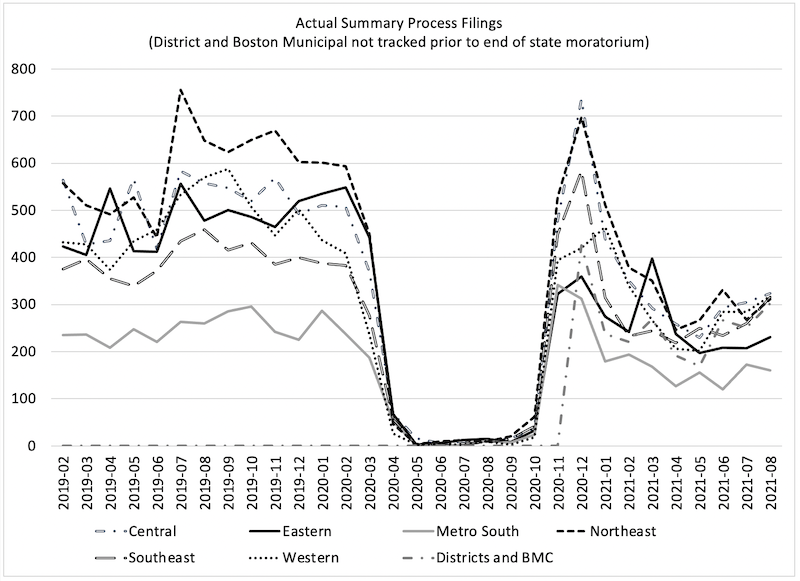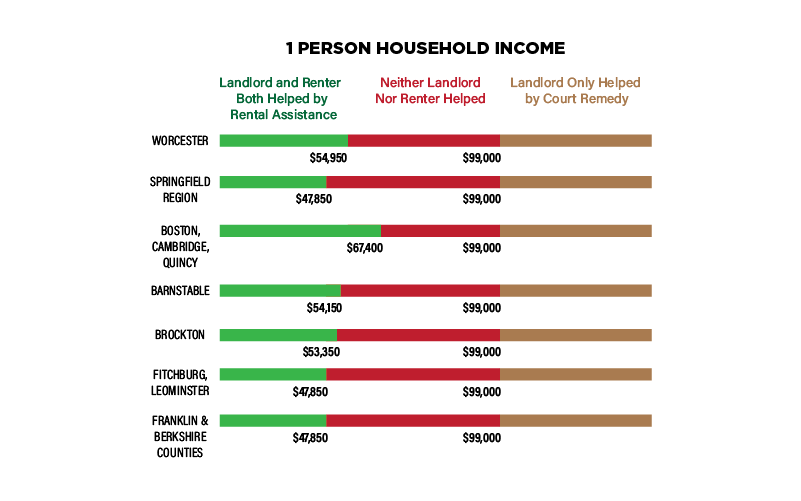Open Letter to the General Court 2021 September: Time-outs have been staggering
By Doug Quattrochi, Executive Director
Dear Legislator:
Here is an important update on our housing safety net. I think things are working, but there are specific problems. This is intended to supplement information you may already be receiving from the administration and others:
- Eviction filings appear to be at “new normal” lows;
- Renters are still well-protected from eviction; and
- Time-outs on applications for rental assistance have been staggering, and need your assistance.
Eviction Filings Appear to be at “New Normal” Lows
MassLandlords has three team members reading each new summary process (eviction) case filed in Housing Court, District Court and Boston Municipal court. We summarize our findings on a weekly, monthly, and quarterly basis[1].
Compared with filings before the pandemic, filings since the pandemic have been lower, even in the absence of our state eviction moratorium, which ended in October 2020. We can all be proud of the accomplishment we have achieved with rental assistance[2].

This is the kind of reduction in eviction filings one might expect to see with long-term structural improvement to our rental housing market (e.g., dramatically expanded housing supply).
Wasn’t the CDC moratorium[1] to thank? Not likely. Landlords could still file cases under the CDC moratorium. And the CDC moratorium’s construction left a large gap between those who qualified for rental assistance and those who could be evicted. Large numbers of households would have had no help inbound and would have been filed against, as the following figure shows.

A one-person household qualified for rental assistance if their income was in the green zone at left. A landlord could evict a renter if their income was in the brown zone at right. In the central red zone, neither party had any remedy: a renter could not get rental assistance, and a landlord could not get possession of their apartment.
In the case of green-zone households, renters should have applied for and received rental assistance. This eliminated the landlord’s need to file for eviction.
In the case of red- and brown-zone households, renters were not eligible for rental assistance and the landlord could still file (but not execute) an eviction. All of these filings should have by now taken place.
Eviction filings remain at historic lows because of rental assistance and not because of an eviction moratorium.
Renters are Still Well-protected from Eviction
Prior to the pandemic, non-payment was the reason for roughly two-thirds of all evictions in Massachusetts. In addition to the rental assistance safety net, two Massachusetts laws already in effect protect renters experiencing non-payment:
Chapter 20 of the Acts of 2021[1] pauses evictions while applications are pending. This gives applicants time to complete an application for rental assistance. This is new, a response to the pandemic.
General Law 151B requires landlords to accept rental assistance. This has been the case since before the pandemic.
This last point merits discussion. General Law Chapter 151b Section 4[1] reads:
It shall be an unlawful practice... For any person furnishing... rental accommodations to discriminate against any individual who is a recipient of federal, state, or local public assistance ... or who is a tenant receiving federal, state, or local housing subsidies, including rental assistance or rental supplements, because the individual is such a recipient, or because of any requirement of such public assistance, rental assistance, or housing subsidy program.
(emphasis added). In practice, this means landlords must provide tax IDs, bank information and full cooperation.
As recently as September, I heard an esteemed member of the General Court on GBH Boston Public Radio say they believed landlords did not have to take rental assistance. This misapprehension likely derives from two unfortunate circumstances.
First, back in October 2020 the administration improperly described rental assistance as optional. The motivation was understandable, because at the time we were asking landlords to accept partial rental assistance in exchange for forgiving the balance owed. But legally this would not work: Chapter 151B was already in effect, so landlords had no choice, and forcing landlords to forgive a balance owed was not legal, either. In any event, federal funding eliminated all constraints over the winter. Rental assistance has not been described as optional since.
Second, there is a slight financial incentive for renter advocates to hem and haw when asked whether landlords have to take rental assistance. If a landlord refuses to participate in rental assistance, for example, then that is a clear violation of Chapter 151B that can be litigated in court for triple damages plus attorney’s fees. This has happened and is happening now, with landlords caught unawares settling for lavishly high figures. Fortunately, many of us are working hard for equal housing opportunity regardless of our financial incentives to the contrary. We can state unequivocally that landlords have to take rental assistance.
In summary: Renters cannot be evicted while waiting for rental assistance, and a landlord cannot refuse to participate.

Time-outs on Applications for Rental Assistance Have Been Staggering, and Need Your Assistance
Despite the great success in reducing eviction filings, and helping renters defend against eviction for nonpayment, filings for nonpayment are still taking place. Sometimes, a case is filed only to encourage faster response from the application administrators (“Getting RAFT Assistance for my Tenant Took Months[2]”). But more frequently, a case is filed because a household is slipping through the cracks. Also, many households have left their housing voluntarily, sometimes owing thousands of dollars in rent for a place in which they no longer live.
Since October 2020, roughly half all applications for rental assistance have been denied.
This percentage is declining, but recently it was still 33% of all applications (August 2021 DHCD EDI Legislative Report). This adds up to tens of thousands of households having asked for help but not having received it. Who are they? What happened to them?
MassLandlords submitted a public records request in June to the Department of Housing and Community Development (DHCD). Their reply indicates that we have had inadequate procedures in place to make linguistically accessible outreach to applicants, among other shortcomings.
We submitted a second public records to DHCD request asking for addresses (but not names!) of applicants for rental assistance, so that we could cross-check these against the territories of the regional administering agencies and our eviction dataset. This request was denied, in our view unlawfully.
We asked the Massachusetts Legal Assistance Corporation for disclosure of resources and priorities. This request was denied, in our view unlawfully.
The administration has not convened the Eviction Diversion Initiative Task Force required under Chapter 257 of the Acts of 2020[1], in our view unlawfully.
Every indication is that our application process has been discriminatorily over-burdensome, and our administration unintentionally ham-fisted, such that a majority of these timeouts ought to have received help.
This is not to say that we are continuing down the wrong path. Our advocacy and that of others, combined with the extremely hard work of staff at the Department of Housing and Community Development, has resulted in a more accessible application and a trend toward declining time-outs.
That said, something must be done to help the tens of thousands of households who previously applied but are now timed out. It might be of enormous benefit if the Eviction Diversion Initiative Task Force could be convened as intended, such that records could be released from the regional administering agencies to this Task Force. Then we could cross-check partial applications with shelter intake and evictions. We could use linguistically appropriate outreach to help these friends and neighbors reapply. We may need to amend the law to make funds available to clear their housing debts. They should be entitled to this help, as they did ask for it at the time.
I would welcome the chance to provide further input; please contact me if I or MassLandlords can be of assistance in advancing this goal.
Sincerely,




